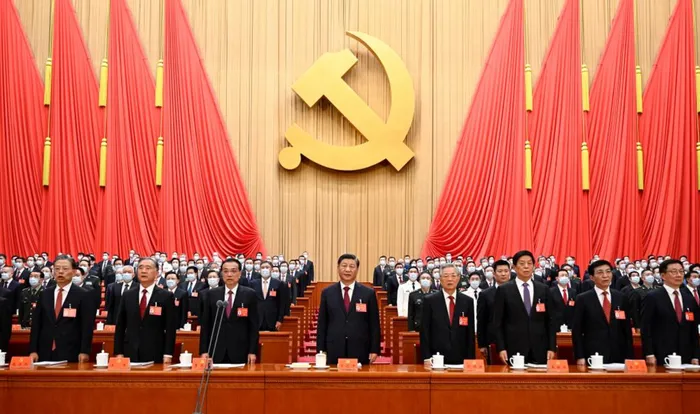‘Two Sessions’ herald a new spring global economy

Xi Jinping,centre, Li Keqiang, Li Zhanshu, Wang Yang, Wang Huning, Zhao Leji, Han Zheng and Hu Jintao attend the opening session of the 20th National Congress of the Communist Party of China (CPC) at the Great Hall of the People in Beijing, capital of China, October 16, 2022. The 20th CPC National Congress opened on Sunday. Picture: Li Xueren / Xinhua
By Wesley Seale
The morning air remains crisp in China’s capital, Beijing, as many look forward to spring in next month.
When residing in the “North Capital”, one recalls hosting friends visiting from South Africa who had underestimated the chill of a Beijing winter. Visiting the Forbidden City, with its frozen encircling canal, was particularly cold.
Yet, as the more than 2,100 political advisers from across China leave Beijing to return to their home towns and cities, they would know that a clarion call for a “new spring” has been made by President Xi Jinping.
At the second session of the 14th National Committee of the Chinese People’s Political Consultative Conference (CPPCC) and the second session of the 14th National People’s Congress (NPC) – better known as the “Two Sessions” – the Chinese president addressed the representatives of the Chinese people who had gathered to discuss several domestic and international policies last weekend.
In particular, Xi highlighted that China “must plan major moves to deepen reform to inject a strong impetus into promoting high-quality development and advancing Chinese modernisation”.
Since the late 1970s, China has not been afraid or shied away from introducing wide-ranging and deep reforms in policy to ensure economic growth, people-centred development and modernisation.
As the one who set off these constant springs of reform, Deng Xiaoping noted that “reform is for China to be open to the world and the world to be open to China”.
The last spring of major reforms came in the wake of the global economic recession in 2008/9, as well as in the aftermath of Covid-19 when the economy stagnated.
Yet Chinese leaders would remind the international community that they know too well the scourges of winters of colonialism, imperialism and poverty.
With Xi having made poverty history in China, the circumstances in which he introduces reforms today are very different from the ones in which Deng Xiaoping led. When the spring of Deng’s reforms dawned, China’s GDP per capita was estimated at approximately $200.
When Xi was elected as general secretary of the Chinese Communist Party in 2012, the country’s GDP per capita had grown to a staggering and estimated $6 000. By the time, Xi had become president, China had become the most industrialised and second-largest economy in the world.
The summer arrival of Xi was due to the spring of reforms brought about by his predecessors, Deng included.
Ironically, Xi was installed during the winter of widespread corruption in China. At the time of his election, the provinces of Liaoning, Hunan and Sichuan in particular were battling with vote-buying corruption in the election of lawmakers and Party officials.
Xi came in on an anti-corruption ticket as it were and hundreds of hospital directors and banking executives, high-ranking government officials, and the president of the Chinese Football Association were investigated and indicted.
These anti-corruption reforms served as the backdrop to the Chinese president’s address to the Two Sessions. What is standard, though, at the Two Sessions is the Chinese government’s work report.
According to Hong Xianghua, the deputy director of the Department of Scientific Research at the Party School of the central committee of the CPC (National Academy of Governance), the five keywords of the government report were “concise, pragmatic, people-centred, inspiring, and confident”.
The report highlighted the need for high-quality economic development which included the need for innovative and development-orientated micro tech, small and medium-sized enterprises. For example, it was pointed out that many Chinese SMMEs struggle to attract high-end tech talent and secure financial support.
These are struggles with which African SMMEs can identify.
The work report also noted the need to ensure agricultural and rural modernisation, ensuring that new ideas, new technologies and business models drive rural residents to sector growth and development.
Again, African countries can learn from China in this regard not to mimic policies or practices but to understand the need for African experts in these sectors to derive policies and practices in order to drive growth, development and modernisation in the African agricultural and rural sectors.
Finally, the Two Sessions looked at the importance of cultural inheritance and development. Prehistoric sites and fine traditional Chinese culture became focus areas in which, for example, a policy was decided that an education commission for the latter – fine traditional Chinese culture – was to be established to ensure the roll-out of this subject in schools across China.
The outcomes of the Two Sessions on the globe will certainly affect most on the global economy and China’s foremost impetus to develop technology.
Many of us know by now that when China sneezes, the rest of the global economy catches a cold.
In the wake of a sluggish Chinese economy, their government’s resolve to introduce reforms to revive their economy should stand the rest of us in good stead.
But as the TikTok debacle is playing out in the United States, a growing impetus to be on the cutting edge of technological development on the side of the Chinese must not jeopardise the rest of the international community.
While the resolve remains there for China to develop technologies responsibly, anything less will only see a winter fall on the rest of us and as Africans, no doubt, we will be the most adversely affected.
Dr Wesley Seale writes on international relations and holds a PhD from Beijing Foreign Studies University